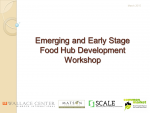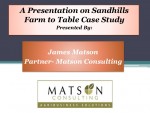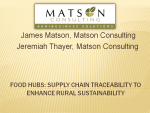The following sections highlight the major works, including publications, presentations, and conferences created by Matson Consulting on food hubs and local food systems. These items are listed from newest to oldest, including some upcoming materials that will be published in the future.
Publications:
 “Running a Food Hub: Learning from Food Closures”
“Running a Food Hub: Learning from Food Closures”
Rural Development Service Report 77. June 2017.
This is the fourth and final volume in the Running a Food Hub series. This document highlights case studies of food hubs that have ceased operations and the factors that lead to their closure. The intent of this report is to share the experiences of these hubs to help new hubs overcome barriers to success. The report profiles six hubs: Aganica Farm Club, FoodEx, Grasshoppers Distribution, Growers Collaborative, Pilot Mountain Pride, and Producers & Buyers Co-op. Matson Consulting authored the case study on Pilot Mountain Pride.
 “Running a Food Hub: Assessing Financial Viability”
“Running a Food Hub: Assessing Financial Viability”
Rural Development Service Report 77. March 2016.
This report is Volume 3 of the USDA Rural Development Service Report 77. It serves as a companion piece to other United States Department of Agriculture reports on food hubs by analyzing the financial decisions which are vital to food hub growth and success. The report’s main focus is on the financial issues faced by food hubs, including business model, profitability, outside factors, and food hub comparison.
 “Buying Local?”
“Buying Local?”
2015 Agricultural & Applied Economics Association and Western Agricultural Economics Association Annual Meeting. July 2015.
Jim Matson along with Jake Brimlow, with Chico State University created this paper using buyer survey data from two geographically distinct regions to provide insight into two developing areas of research in local food system development: estimating indirect demand for local food, and the importance of food safety as a barrier to local food markets. The findings of this research were presented at the AAEA Annual Meeting in July.
 “Running a Food Hub: A Business Operations Guide”
“Running a Food Hub: A Business Operations Guide”
Rural Development Service Report 77. July 2015.
This report is Volume 2 of the USDA Rural Development Service Report 77. It serves as a companion piece to other United States Department of Agriculture reports on food hubs by providing in-depth guidance on starting and running a food hub enterprise. The report’s main focus is on the operational issues faced by food hubs, including choosing an organizational structure, choosing a location, deciding on infrastructure and equipment, logistics and transportation, human resources, and risks.
 “Running a Food Hub: Lessons Learned from the Field”
“Running a Food Hub: Lessons Learned from the Field”
Rural Development Service Report 77. April 2015.
This document represents actions to fill the void of current research on food hub operations and day-to-day lessons learned from those individuals starting and operating food hubs. “Lessons Learned from The Field” reports the findings from in depth interviews with 13 food hub ventures from across the nation. The interviews conducted with each food hub were guided by a list of pre-selected topics that were common to all the interviews, but as new topics were identified, additional questions were asked to further probe and capture the unique and individual nature of each entity.
 “Sandhills Farm to Table”
“Sandhills Farm to Table”
Journal of Food Distribution Research. November 2014
This paper published in the Journal of Food Distribution Research is part of the series on Local Food Systems and Interactions with Entrepreneurship. In it, Matson Consulting explores the innovative multi-stakeholder cooperative structure of Sandhills Farm to Table and how this business uses their organizational structure to connect producers, consumers, and workers to each other and the community.
 “What We’ve Learned So Far”
“What We’ve Learned So Far”
Rural Cooperatives Magazine. July/ August 2014.
This article condenses into a “lessons learned” format some of the critical knowledge derived from interviews conducted with 14 food hubs from across the United States about this rapidly growing, but still young, segment of the food industry. In the best tradition of cooperatives, these food hub leaders hope others will learn from their experiences and the roads they have traveled so far. This article was excerpted from Running a Food Hub: Lessons Learned from the Field, soon to be available from USDA as part of a technical report series on food hubs.
 “Food Hubs: Supply Chain Traceability to Enhance Local Food Systems”
“Food Hubs: Supply Chain Traceability to Enhance Local Food Systems”
Food Studies: An Interdisciplinary Journal. July 2014.
This paper, published in Food Studies: An Interdisciplinary Journal, discusses how food hubs can provide a path to rural revitalization and sustainability through enhancing traceability that assists local producers in gaining greater value for their products, as well as satisfying the increased desire of consumers to fulfill a food based social mission to increase food sustainability and health, and address the growing concern over food deserts.
 “Food Hubs: an evolution of the co-op business model”
“Food Hubs: an evolution of the co-op business model”
Rural Cooperatives Magazine. January/ February 2014.
Food hubs can be viewed as a natural progression in the application of cooperative principles and ideals. Food hubs, driven by the cooperative spirit, expand the traditional concept of agricultural cooperatives to include other stakeholder groups besides producers. This article published in Rural Cooperatives discusses how food hubs represent a continued evolution of the cooperative ideal of producers working together to provide feasible outlets for their products, while also addressing the concerns of workers, consumers, and the community.
 “Feasibility Study for a Wholesale Food Hub”
“Feasibility Study for a Wholesale Food Hub”
August 2013.
Matson Consulting worked with Moore County Partners in Progress and North Carolina Cooperative Extension at the Plants for Human Health Institute to create a feasibility study exploring the econo
mic and technical possibilities of a wholesale food hub venture. The feasibility study addressed several operational topics including some of the following:
- Potential funding sources
- Business organization
- General food hub operating procedures
- Food hub implementation plan
- Sales and marketing feasibility
 “The Role of Food Hubs in Food Supply Chains”
“The Role of Food Hubs in Food Supply Chains”
Journal of Agriculture, Food Systems, and Community Development. July 2013.
Matson Consulting has authored a research commentary published in the Journal of Agriculture, Food Systems, and Community Development titled “The Role of Food Hubs in Food Supply Chains.” As stated in the abstract, “This commentary provides a brief context to present relevant questions for further research in the emerging trend of food hubs.”
 “Local Foods and the Value of Direct Marketing in Virginia”
“Local Foods and the Value of Direct Marketing in Virginia”
Virginia Foundation for Agriculture, Innovation, and Rural Sustainability. Jan. 2013.
Matson Consulting and the Virginia Foundation for Agriculture, Innovation, and Rural Sustainability created a research document titled “Local Foods and the Value of Direct Marketing in Virginia” which discusses the pros and cons of several types of direct marketing sales channels.
 “The Role of Food Hubs in Local Food Marketing”
“The Role of Food Hubs in Local Food Marketing”
USDA Rural Development Service Report 73. Jan. 2013.
USDA Rural Development Service Report 73 “The Role of Food Hubs in Local Food Marketing” provides another approach to considering food hub organization. The document views food hubs through their business organization, and discusses examples in categories such as non-profits, for-profit, cooperatively structured, and multi-structured, and virtual. The document also discusses numerous functions of food hubs in addition to simple food aggregation and sales.
 “Creating a Roadmap for Food Hub Development”
“Creating a Roadmap for Food Hub Development”
Rural Cooperatives Magazine. July/August 2012.
In this Rural Cooperatives article, the authors explore the definition of a food hub and a “roadmap” to developing a food hub. The article includes a list of some of the factors that appear to contribute to success of a food hub more than others. These lessons were derived from reviewing examples from hubs across the country.
 “Because we’re all in this together”
“Because we’re all in this together”
Rural Cooperatives Magazine. January/ February 2012.
This Rural Cooperative article focuses on the mission and operations of Sandhills Farm to Table Cooperative. Based in Moore County, North Carolina, this cooperative works to provide fresh local food to their co-op members, while also donating funds to local schools and organizations. Matson Consulting chose to highlight this business because of Sandhills Farm to Table’s unique business structure. As a multi-stakeholder cooperative, this co-op is owned by producers, workers, and consumers.
 “Virtual Food Hub Helps Virginia Producers Tap into Local Food Markets”
“Virtual Food Hub Helps Virginia Producers Tap into Local Food Markets”
Rural Cooperatives Magazine. May/ June 2011.
Published in Rural Cooperatives, this article highlights Lulus Local Food, which takes an innovative approach to the food hub model by operating as an online food hub. Lulus developed a software program to help lower the barrier to market entry from small- to medium-size producers and co-ops looking to increase local sales.
Presentations and Conferences:
 2016 South Carolina AgriBiz and Farm Expo
2016 South Carolina AgriBiz and Farm Expo
Florence, South Carolina. January 14-15, 2016.
Jim Matson participated in two sessions during the expo where he presented “Federal Grant: What to do” and “What Intermediate Food Buyers Are Looking For.” For his first presentation, Matson discussed federal grants and important information to keep in mind before and during an application process. His second presentation discussed the different factors which food buyers look for from potential suppliers. This information is key to producers who are looking to grow their buyer base, or new growers who need to know what to do to attract larger scale buyers.
 Agricultural & Applied Economics Association Annual Meeting
Agricultural & Applied Economics Association Annual Meeting
San Francisco, California. July 26-28, 2015.
Jim Matson with Matson Consulting, along with Jake Brimlow, with Chico State University created a paper and presentation using buyer survey data from two distinct regions to provide insight into two developing areas of research in local food system development: estimating indirect demand for local food, and the importance of food safety as a barrier to local food markets. The findings of this research were presented at the AAEA Annual Meeting in July.
 Creating Values-Based Food Hubs Grantee & Partner Meeting
Creating Values-Based Food Hubs Grantee & Partner Meeting
Louisville, Kentucky. April 23, 2015.
Jim Matson and Jessica Shaw from Matson Consulting, along with Devona Sherwood from the Wallace Center presented the Emerging Food Hub Development workshop at the Grantee & Partner Meeting hosted by W.K. Kellogg Foundation. The presenters used materials developed by Matson Consulting to facilitate a workshop and discussion between food hub operators.
 The Million dollar Question: What is break-even and viability for different food hub models?
The Million dollar Question: What is break-even and viability for different food hub models?
National Good Food Network. March 19, 2015
Jim Matson presented on food hub financial viability during a webinar hosted by the National Good Food Network. Scheduled to take place on March 19, 2015 at 3:30 PM, this webinar discussed the operations and financial books from several illustrative examples of various hypothetical hubs to tease apart those “magic numbers” – where each model reaches profitability and true viability. The information for this webinar was developed in coordination with VA FAIRS and USDA Rural Development.
 Georgia Organics Recipe for Change 18th Annual Conference & Expo
Georgia Organics Recipe for Change 18th Annual Conference & Expo
Athens, Georgia. February 20, 2015
The Wallace Center at Winrock International created the Emerging Food Hub Development Workshop held at the Georgia Organics Recipe for Change Conference & Expo. Matson Consulting was the lead materials developer and helped create the presentation and supplemental materials for the day-long workshop. The workshop focused on helping emerging or new food hubs with business development. Some of the topics addressed include:
- Business organization and business models
- The value supply chain
- Business operations
- Marketing
- Financial viability
 16th Annual National Value-Added Agriculture Conference
16th Annual National Value-Added Agriculture Conference
Baltimore, Maryland. May 14, 2014
Matson Consulting attended the 16th Annual National Value-Added Agricultural Conference to present on an article for the National Agricultural & Rural Development Policy Center. The presentation highlighted the research and commentary on the operations of Sandhills Farm to Table, as determined in the case study published in the Journal of Food Distribution Research.
 National good Food Network Food Hub Collaboration
National good Food Network Food Hub Collaboration
Raleigh, North Carolina. March 27, 2014
Matson Consulting also presented at multiple sessions at the NGFN Food Hub Collaboration Conference. Topics for this conference included
- “Food Hub Viability,”
- “Getting the Margin to Meet the Mission,”
- “Multi-Stakeholder Benefits and Opportunities.”
 Third International Conference on Food Studies
Third International Conference on Food Studies
Austin, Texas. October 16, 2013
Matson Consulting presented project work conducted in partnership with VA FAIRS at the Third International Conference on Food Studies. Presentations included “Food Hubs: Supply Chain Traceability to Enhance Rural Sustainability,” which addresses how food hubs are emerging as a solution for local food marketing in the United States.


